The first thing Simon Farrell can remember, after being woken from a medically induced coma, is trying to tear off his oxygen mask.
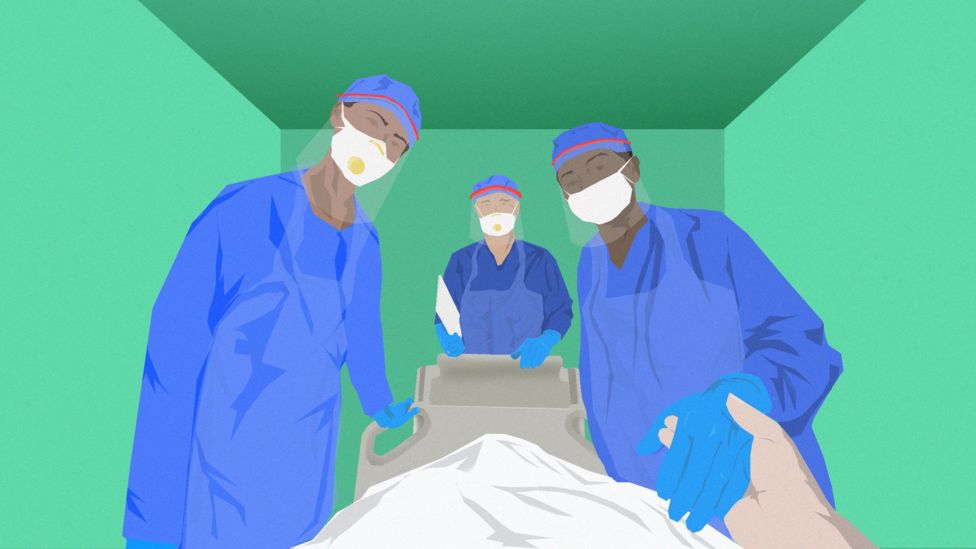
He had been in intensive care for 10 days, reliant on a ventilator just to breathe.
"I was trying to pull the mask off my face, and the nurse kept putting it back on," he recalls.
When doctors woke him up, his body had fought off the worst of Covid-19 but he still needed oxygen to support his damaged lungs. And the 46-year-old father-of-two was suffering from such severe delirium he was trying to deny himself the oxygen he required.
"Try to stop me," he remembers saying, when nurses at Birmingham's Queen Elizabeth Hospital said they would have to put his hands in boxing glove-sized medical mittens unless he relaxed.
"In the end they had to tape my hands up. I was trying to tear the mittens off, I managed to bite through them, and they had to put new mittens on."
It is not an unfamiliar story for anyone working in intensive care. The assault Covid-19 mounts on the most severely ill means patients are ventilated for longer, and require a deeper level of sedation, than the typical ICU patient.
That has produced "a lot of delirium, confusion and agitation", explains Dr Kulwant Dhadwal, a consultant who runs the intensive care unit at London's Royal Free Hospital.
"Usually if you have a surgical procedure, or normal pneumonia patients come to ICU, you wake them up and they're less confused and less disoriented than this."
"This particular group of patients were a lot more difficult to wean off the ventilator."
Even when that process is a success, it is only the beginning of a long process of physical and psychological recovery. And now the UK has moved past the peak of the virus, attention is turning to the huge challenge - both in the health service and in the community - of rehabilitating Covid-19 survivors.
"Often rehabilitation is seen as a Cinderella service and not a priority," says Sally Singh, professor of pulmonary and cardiac rehabilitation at the University of Leicester.
"But because of Covid, and the number of people that it has affected, the need is pressing. It has become a national priority - to support people to get better."

A long road
Tens of thousands of people around the UK are now setting out on that journey.
Some came close to death in intensive care units, others needed less intrusive hospital treatment to help them through the worst. All of them have had their lives changed by Covid-19.
But for the most seriously ill patients in intensive care, rehabilitation begins well before they are woken from a coma. Physical and psychological support has to be there from the start. Even when a patient is asleep, nurses and therapists will move their joints and their bodies to make sure they don't get too stiff.
"For example, we have an in-bed bike," explains Kate Tantam, a specialist rehabilitation sister in intensive care at University Hospital Plymouth NHS Trust.
"Even if a patient is on multiple organ support on a ventilator, and on lots of drugs to keep them alive, we will still put them on a bike."
"We bring it to the bed, and we can put their feet into it, and the machine can then do the work for you."
ICU staff will also talk constantly to patients while they are deeply sedated, telling them where they are, and what is happening to them, and reassuring them that they are safe. It's all part of the process of preparing them for the moment when they are woken up.
"Some patients do wake up saying, 'I remember your voice,'" says Kulwant Dhadwal. "They wake up with some kind of memory."
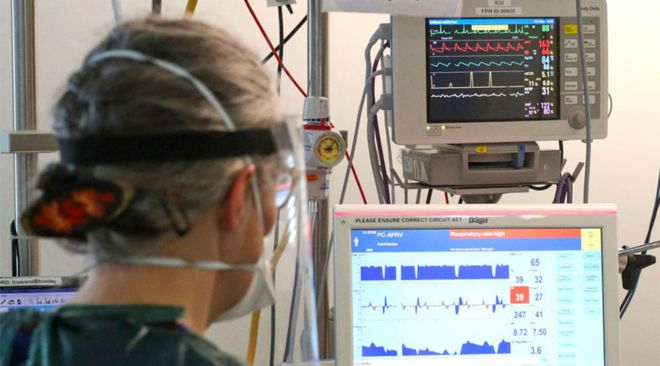 GETTY IMAGES
GETTY IMAGES
But the process with Covid-19 has proved even more delicate and difficult than normal, partly because so many ICU patients were on mechanical ventilators for extraordinarily long periods of time.
Many of them woke up profoundly weak, although some regained strength unexpectedly quickly.
"Usually when somebody's been asleep for 40 days or more, it takes six weeks or longer for them to be totally free of the ventilator, to be ready to even start walking or standing," Kulwant Dhadwal says.
"But some of these patients were making progress within a week, which we found very unusual, very specific to this disease."
Another challenge in the immediate recovery from critical illness with Covid-19 is the severe inflammation.
Many patients can't cope with a breathing tube inserted through the mouth because the larynx and the area above the vocal cords are badly swollen as part of the illness. That means doctors have often had to often perform tracheostomies, creating an opening in the neck to gain access to the windpipe, in order to remove the breathing tube that connects patients to the ventilator.
"You've got to look after the tracheostomy, it's a wound in the neck," explains Carl Waldmann, a consultant in intensive care at the Royal Berkshire Hospital in Reading.
"So, it was a long, slow process getting them off the ventilator. It might take them a week or two weeks or even longer."

"I was nearly a goner"
And behind every observation lies a human story.
Abraham Raskin's family were told in late April that it was unlikely he would survive. But on 12 June he finally left the Royal London Hospital after more than 50 days in intensive care, a tracheostomy, and a month in a medically induced coma.
"The very fact that I'm alive now is a miracle," he says, "I was nearly a goner."
On a video call arranged by nurses on 18 May his family saw his face for the first time since he was taken into hospital in early April. He wasn't able to say anything, but he did raise an eyebrow.
Abraham was severely delirious for some time after waking up. "I was talking all kinds of rubbish," he says.
"Afterwards when I heard about what I was saying, I felt like I was mad or something. It's not pleasant."
But he is now back at home, still very tired, and following a basic exercise programme planned from him by a physiotherapist. With support from family members, he can get upstairs to sleep at night.
"Some people can't really walk anymore when they come out of this," he says, "and some take months to recover. I hope I'm not one of them."

Delirium
As many as three-quarters of intensive care patients who need mechanical ventilation to help them breathe will suffer from delirium. And the observations of many doctors suggest that delirium has been particularly acute, and hallucinations unusually vivid, for people who fall critically ill with Covid-19.
Delirium can be caused by the infection itself, and the fevers which accompany it. But it is intensified by the strong sedative drugs that have to be used to keep patients comfortable, and the unsettling environment of intensive care they find themselves in.
While patients are in a coma, and after they wake up and begin withdrawing from these drugs, they often experience frightening hallucinations, and cling to unsettling beliefs about what is going on.
"Delirium doesn't have a dreamlike quality," says Dorothy Wade, the principal health psychologist in intensive care at University College Hospital in London. "Patients always say 'it was completely real - I was just living in this terrifying alternative reality.'"
Doctors think that chemical imbalances prompt the brain to create its own explanation for why the body can't move and the patient can't speak. Often people think they've been kidnapped or tortured, or they think they're in a prison cell about to be put on trial.
"They tend to feel that the nurses and the doctors and the staff are all in some conspiracy," says Dorothy Wade, "that this is all part of a conspiracy to make money out of them by selling their blood or their organs."
It means that psychologists like Dr Wade try to step in as early as possible. It's important not to argue with delirious patients, she says, but instead to try to offer reassurance about what has really been happening.
Simon Farrell left hospital relatively quickly after being taken off a ventilator, but he still recalls the vivid nature of the delirium he experienced.
"I remember Elliott, my younger son, coming into the room in PPE," he says. "Now, that clearly wasn't right. No children were allowed on the ward. The hospital was locked down. It didn't happen."
In his head at the time, though, he believed it to be absolutely true.
"You just feel it is what's happening," he says. "And there was a lot worse than that. That was a simple one."

- SCHOOLS: When will children be returning?
- EXERCISE: What are the guidelines on getting out?
- THE R NUMBER: What it means and why it matters
- AIR TRAVELLERS: The new quarantine rules
- LOOK-UP TOOL: How many cases in your area?

Family
The challenge of dealing with the acute delirium that accompanies Covid-19 has been heightened by the fact that family members can't be at the bedside when patients are trying to return to reality. Seriously ill people wake into a world of flashing lights and machines, of disrupted sleep and hospital staff in full PPE.
"It has a huge impact on patients," explains Krystyna Walton, a consultant in rehabilitation medicine at the Salford Royal Hospital in Greater Manchester. "They are already confused, and it must be incredibly difficult."
"If somebody has suffered encephalitis (inflammation of the brain) and they have memory problems or insight problems, they're not aware of the way that Covid has affected the world, so they can't understand why there are no visitors."
And the social isolation imposed by the pandemic also has repercussions for friends and family.
Hannah Farrell, Simon's wife, works as a neuro physiotherapist at the Queen Elizabeth Hospital in Birmingham where he was a patient. She recalls one evening when he was still severely delirious, a nurse she knew rang and suggested that hearing her voice on the phone might calm Simon down.
"Apparently, it settled Simon, but it certainly didn't settle me," she says. "I didn't sleep all night, because Simon just didn't sound like Simon at all."
"For me, it was quite upsetting, and I'm sure other relatives have said the same."

Long-term problems
Some patients can still be delirious weeks after waking up.
And delirium, says Kate Tantam, along with other frightening early experiences, "is the key link to post-traumatic stress, anxiety and depression" among people who survive their time in ICU.
Roughly one in five people who pass through intensive care in normal times go on to exhibit symptoms of post-traumatic stress disorder (PTSD). And the signs are that with Covid patients that number could be considerably higher.
The same goes for more general anxiety and depression after leaving hospital. The extreme circumstances of the Covid pandemic, and the social isolation that has come with it, are likely to make things worse.
The lack of a reassuring family presence, for example, continues to pose additional problems after patients are released from acute hospital wards into care homes and rehabilitation units. Hospitals have invested in iPads to facilitate contact, and family liaison teams make sure video calls take place every day, but it's not quite the same.
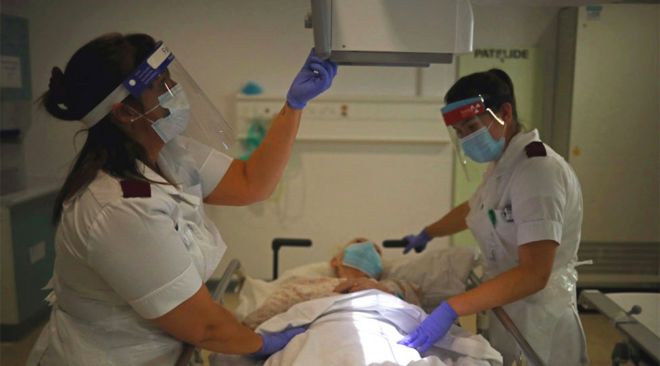 GETTY IMAGES
GETTY IMAGES
Krystyna Walton gives the example of one of her patients who had severe Covid pneumonia, as well as renal failure and dialysis.
The patient spent several weeks in critical care, and several more on a medical ward before being moved to a rehabilitation ward with cognitive deficits. They have not been able to see their family for three months.
Normally in a rehabilitation unit, staff would try to personalise a patient's surroundings and encourage them to wear their own clothes. But the restrictions surrounding Covid have prevented much of that.
And because family members are unable to visit, or speak to medical staff face-to-face, they often struggle to understand just how sick their relative has been.
"There are no visitors in care homes, there are no visitors in rehabilitation in the NHS or in the independent sector," says Krystyna Walton.
"And even after leaving rehab there have been restrictions that we all have had to deal with, which makes it more difficult to visit a vulnerable person in their own home. All of this has a huge psychological impact."
So, the NHS is going to have to prepare for the possibility of a fresh wave of PTSD patients, just as it is trying to deal with a backlog of mental health (and other) cases which have been neglected during the worst of the pandemic.
"We won't know for several months how big a problem this is going to be," says Dorothy Wade.
"To begin with people are very relieved to be out of hospital, especially after such a long stay. Sometimes it can take quite a long time for them to realise that something still isn't quite right."
It doesn't always turn out that way. Alongside post-traumatic stress, doctors acknowledge the concept of post-traumatic growth, and point to patients who emerge from critical care with a new outlook on life.
"There are some people who - no matter how difficult this has been - find themselves in a more positive frame of mind," explains Julie Highfield, a consultant clinical psychologist based in intensive care units in Cardiff.
"People feel this is a chance they never thought they would have, and they are determined to live their life well."
Simon Farrell is certainly trying to focus on the positive and he has been recovering week by week. But he admits it has to be tinged with realism.
"I think people feel if they get physically stronger, they're then mentally stronger and they're fine. And that's not always the case. The two are not aligned."

Physical recovery
For many people physical recovery can provide the biggest challenge, particularly if they have spent weeks in intensive care.
"Covid is a nasty, nasty disease that kicks every single system you've got in the neck," says Kate Tantam.
And sometimes when people wake up from four weeks of sedation, like thousands of Covid-19 patients have done, the only thing they can move is their fingertips.
"We have to rebuild everything with them," she says, "and teach them how to do everything physically again - from being able to feed yourself or being able to touch your hair, to being able to stand and being able to sit."
A prolonged period of recovery is not unusual after intensive care, but many Covid-19 patients have experienced particularly severe fatigue and muscle wasting. They are exhausted - sitting in a chair for half an hour might be followed by four hours sleep. And rebuilding muscle takes time.
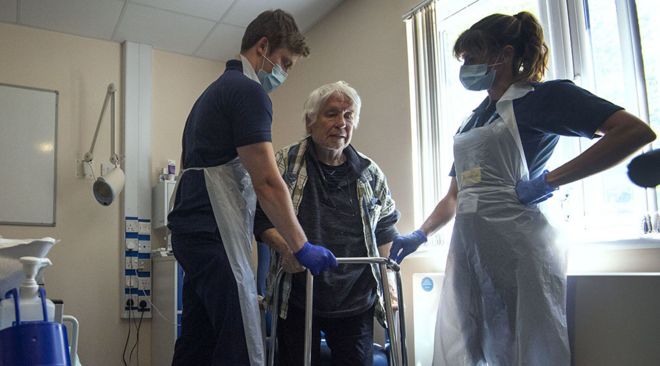 GETTY IMAGES
GETTY IMAGES
"If we don't give patients the right level of nutritional input, they are not going to recover," Kate Tantam says.
So, dieticians have an important role to play, alongside physiotherapists, speech and language therapists and occupational therapists. If you have just survived a multi-system disease which attacks different parts of the body in different ways, it stands to reason that you need various forms of help to recover.
Many Covid patients will return to normal life relatively quickly. But some have suffered kidney failure and may require ongoing renal support, while others will need to be referred to cardiologists or may have developed neurological conditions that require specialist care.
The challenge, says Carl Waldmann, "is to make sure that everyone gets what they need, and that the right support can be provided at the right time."
"I think the greatest burden will be in the community," argues Krystyna Walton, "because many of these patients will have quite subtle deficits that will only become evident to them as they start recovering physically, weeks and months after going home."

Breathlessness
The most common physical challenge for recovering Covid-19 patients is shortness of breath - and that can apply to people who had moderate as well as severe symptoms of the disease.
"For patients that are coming out of hospital," says Sally Singh, "clearly they're breathless because they've had a respiratory disease. Their lungs are temporarily damaged, but they are also deconditioned because they've been lying in a hospital bed for so long that they've become pretty unfit."
It means that simple things like going up and down stairs can become extremely challenging, especially in elderly patients.
But breathlessness is an issue that goes well beyond survivors of intensive care. And a significant minority of people who've been infected with the coronavirus are still struggling to shake it off.

"I'd crash in a heap"
Jenny Goldblatt, an infectious diseases doctor at the Royal Free Hospital, fell ill with Covid-19 in March and it has lingered ever since - returning in waves of fatigue, chest pains and breathing difficulties.
She spent a couple of days in hospital in March, where she was given a little extra oxygen. But it was only after going home that her problems began in earnest.
"Every 10 days or so I'd start to feel a little better and I'd start to go for longer walks," she says. "But then I'd crash in a heap and couldn't get out of bed for a week."
It was a month after falling ill that she first managed to walk to the end of the road and back. A keen cyclist, her next goal is to cycle around the block.
"I can't imagine when I will be able to take my bike for a proper ride, and if I think about that too much it gets a bit depressing."
Jenny thinks she has cleared the virus, and she has "easily detectable" antibodies in her blood, but her body is continuing to react in unusual ways. Post-viral fatigue is not unique to Covid-19, but this is something more.
Jenny has suffered chest pains and breathlessness; other patients with lingering symptoms report severe headaches or abdominal pains. Three months after falling ill, going back to work or resuming normal life is out of the question.
"I am getting better slowly," she says, "but I can't be too ambitious. It is frustrating to be on this rollercoaster, with absolutely no idea how long the journey will take."

Challenges
Previous medical experience with pneumonia suggests it can take months, or in extreme cases years, for patients to get back to where they were before. With Covid-19, we are still early in the cycle of rehabilitation and recovery, and every patient is different.
"The honest answer is we don't yet know how long it will take," says Sally Singh. "People are researching that as we speak - monitoring chest x-rays, symptoms and the wellbeing of patients to help us identify what the best intervention to support these people may be."
The trouble is the provision of rehabilitation services across the country can be patchy, especially for people emerging from critical care. And the NHS is already dealing with a massive backlog of non-Covid cases that have been delayed.
"The huge challenge," says Krystyna Walton, "is going to be the increase in numbers."
At the peak of the outbreak the priority was to get patients out of acute hospital settings quickly to free up bed space. That means in many cases the rehabilitation assessments that would normally be done in hospital would have been done in the community, or in a care home or a non-specialist rehabilitation setting.
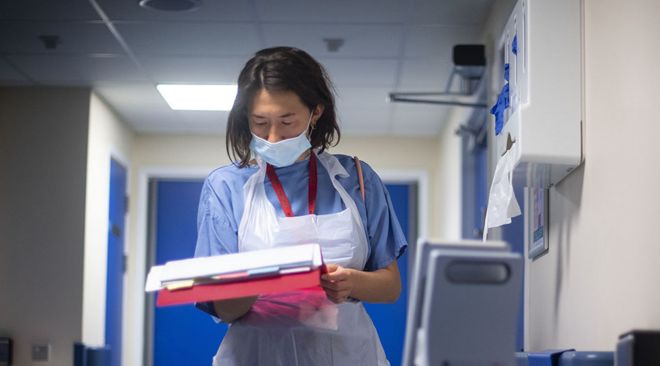 GETTY IMAGES
GETTY IMAGES
"And my suspicion," Krystyna Walton adds, "is that many patients may have not had their needs assessed properly."
Carl Waldmann, who has been working on improving the rehabilitation of seriously ill patients for more than 25 years, says one of the best analogies he can think of is building a rocket, and training an astronaut.
"You put them up into space, but you also have to think about where they're going to land and what we're going to do when they get back."
It is the same, he says, if you put a patient through the complexities of intensive care.
"We've had some patients who need seven specialists looking after them afterwards," he says, "and unless they have all those bits of the jigsaw puzzle, there is a chance they won't make the recovery they could have made."
It is important to emphasise those rehabilitation needs don't stop after the immediate recovery period. Many patients will suffer from scarring of the lungs - a permanent and often debilitating condition. Doctors also know that a significant number of people who have been critically ill have suffered cognitive deficits. Ideally they should have screening for return to driving a vehicle, and for return to work.
"Rehabilitation has to sort of blur into real life and getting back out into the community," says Krystyna Walton, "doing what you used to do before, looking after your family, earning an income, enjoying leisure facilities and exercise."
"And that is what takes time and expertise."
The NHS and individual hospitals are of course building rehabilitation into their Covid recovery plans, but this is a system that has been overlooked for years. Experts in the field hope, despite all the pressures, that Covid will provide a launch pad for change.
"Hospitals are very good at treating people, doing something to somebody to make them better," says Kate Tantam. "But what they are not always very good at is prioritising the therapeutic and rehabilitation input afterwards."
It is, in other words, not just about survival, it is about health-related quality of life.
"There is no point giving somebody a massive intensive care stay, if you don't try to return them to where they want to be."
Additional reporting: Oliver Barnes
Illustrations: Emma Lynch

You may also be interested in:
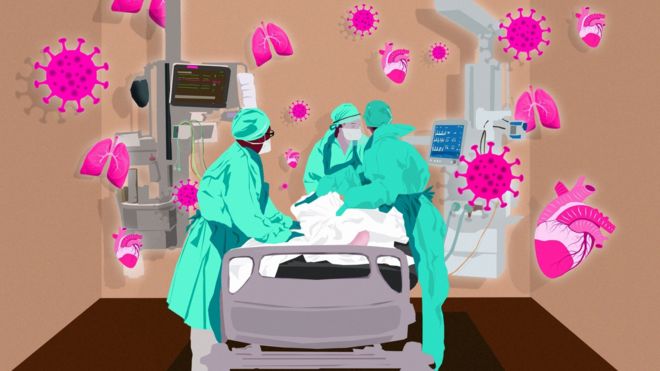
When you talk to intensive care doctors across the UK, exhausted after weeks of dealing with the ravages of Covid-19, one phrase emerges time after time: "We've never seen anything like this before."
They knew a new disease was coming, and they were expecting resources to be stretched by an unknown respiratory infection which had first appeared in China at the end of last year.
And as the number of cases increased, doctors up and down the UK were reading first-hand accounts from colleagues in China, and then in Italy - in scientific journals and on social media - about the intensity of infection.
"It felt in some ways like we were trying to prepare for the D-Day landings," says Barbara Miles, clinical director of intensive care at Glasgow Royal Infirmary, "with three weeks to get ready and not a great deal of knowledge about what we would be facing".
But what arrived in the UK as winter turned into spring took even the most experienced ICU specialists by surprise.
https://www.bbc.com/news/53193835